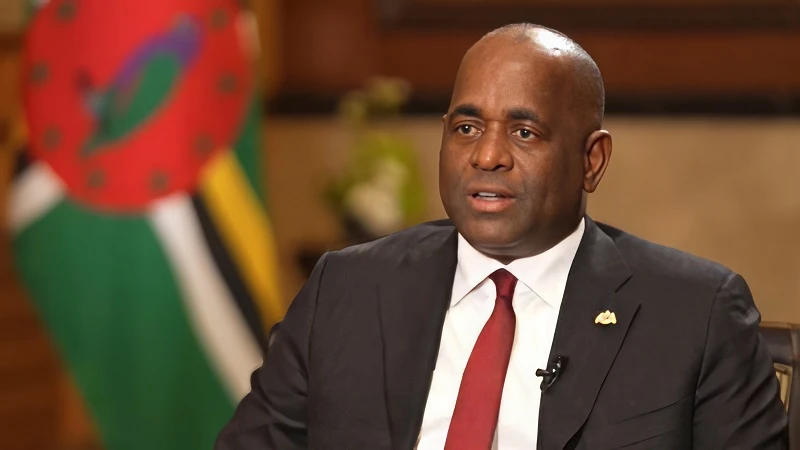Roosevelt Skerrit

Roosevelt Skerrit, born on June 8, 1972, in Vieille Case, Dominica, has served as Prime Minister of the Commonwealth of Dominica since 2004. He is one of the longest-serving leaders in the Caribbean and has played a defining role in shaping Dominica’s political, economic, and diplomatic direction for over two decades.
Early Life and Education of Roosevelt Skerrit
Roosevelt Skerrit grew up in the rural village of Vieille Case on the northern Dominican coast, a community deeply rooted in agriculture and traditional village life. His upbringing in this close-knit environment is often cited as shaping his deep sense of community responsibility and connection to ordinary citizens.
He attended Vieille Case Primary School before progressing to the Dominica Grammar School in Roseau for his secondary education. Afterwards, he pursued tertiary studies in the United States. He first attended New Mexico State University and later transferred to the University of Mississippi, earning bachelor’s degrees in Psychology and English in 1997.
After returning to Dominica, Skerrit worked as a lecturer at the Dominica State College, teaching English and engaging with young minds, before transitioning fully into politics.
Political Career and Rise to Prime Minister
Roosevelt Skerrit’s political journey formally began in 2000, when he was elected as the Parliamentary Representative for the Vieille Case Constituency under the banner of the Dominica Labour Party (DLP). His early ministerial appointments included Minister of Youth Affairs, Sports, and Education, demonstrating the party’s confidence in his leadership potential.
Following the sudden death of Prime Minister Pierre Charles, Skerrit, at the age of 31, was appointed as Prime Minister, becoming the youngest person in the world to hold the office of a sovereign nation at that time.
Since then, he has led the DLP to consecutive electoral victories in the 2005 General Election, the 2009 General Election, the 2014 General Election, the 2019 General Election, and the 2022 General Election, solidifying his position as one of the Caribbean’s most enduring political figures. In addition to being Prime Minister, Skerrit has held key ministerial portfolios over the years, including Minister for Finance, Minister for Foreign Affairs, and Minister for Education.
Major Achievements and National Initiatives
Skerrit’s administration has overseen several major national initiatives, particularly focusing on:
- Post-disaster recovery: After Hurricane Maria in 2017, he spearheaded efforts to rebuild Dominica with a vision to become the world’s first climate-resilient nation.
- Housing development: Thousands of homes have been built under government programs to provide hurricane-resistant housing for citizens.
- International airport project: The government initiated the construction of Dominica’s first international airport to boost tourism and facilitate global connectivity.
- Diplomatic relations: Under Skerrit’s leadership, Dominica established diplomatic ties with the People’s Republic of China in 2004 and joined the Bolivarian Alliance for the Peoples of Our America (ALBA), strengthening relations with Venezuela and Cuba.
In addition, Skerrit has championed Dominica’s role in regional organizations like CARICOM and the Organisation of Eastern Caribbean States (OECS), having served twice as Chairman of CARICOM.
Regional and International Presence
Throughout his tenure, Skerrit has positioned Dominica on the global stage as an advocate for small island developing states, particularly in forums addressing climate change, disaster resilience, and sustainable development. His engagement in international diplomacy has expanded Dominica’s partnerships beyond the traditional Caribbean sphere, reaching Asia, Africa, and Latin America.
Controversies and Public Scrutiny
While Skerrit’s leadership has been marked by stability and economic development, it has also faced controversy. In 2015, scrutiny arose when Chinese billionaire Ng Lap Seng was arrested in a UN bribery investigation; photographs of Skerrit and Ng surfaced shortly before the arrest. Skerrit stated he was never approached by U.S. authorities or implicated in wrongdoing.
In 2019, an Al Jazeera investigation alleged that Dominican diplomatic passports were being sold. Skerrit and his government denied any misconduct, asserting that appointments of ambassadors and diplomats were made in the national interest and in keeping with international standards.
Personal Life and Family
Roosevelt Skerrit is married to Melissa Poponne-Skerrit, a Member of Parliament representing the Roseau Central Constituency since 2019 under the Dominica Labour Party. The couple married in 2013 in a ceremony that drew attention across the island.
They have two children together:
- Dimitri Skerrit (son)
- Dakota Skerrit (daughter)
In addition, Roosevelt Skerrit has a son, Demetrius Skerrit, from a previous relationship. Family is an important part of his life, and he frequently references his wife and children in public speeches and social media posts, emphasising the importance of strong family values and community-centred living.
The Skerrit family resides primarily in Roseau. They balance public service with private family time, often attending local events and church services together.
Legacy and Leadership Style
Roosevelt Skerrit’s leadership style is often pragmatic, grassroots-oriented, and charismatic. He is known for maintaining a strong connection to rural communities, personally visiting villages, listening to concerns, and participating in local celebrations. His political brand blends traditional Labour Party values of social justice and community development with a modern emphasis on international diplomacy and economic resilience.
As Dominica continues to navigate the challenges of climate change, economic modernisation, and regional integration, Skerrit’s leadership remains a defining force shaping the island’s future trajectory. Whether through his focus on housing, education, or resilience-building, his tenure reflects both the aspirations and complexities of modern Dominican governance.




